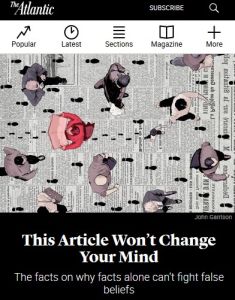Join getAbstract to access the summary!

Join getAbstract to access the summary!
Julie Beck
This Article Won’t Change Your Mind
The Facts on Why Facts Alone Can’t Fight False Beliefs
The Atlantic, 2017
What's inside?
The reluctance to give up false truths may have been an evolutionary advantage for early humans.
Recommendation
Why do some people stubbornly adhere to fake news stories despite overwhelming evidence to the contrary? Evolutionary history may provide some clues, writes psychology writer Julie Beck in The Atlantic. Because the survival of early humans depended on their ability to cooperate and foster strong social ties, people’s tendency to hold on to their tribes' beliefs at all costs may well have been an adaptive trait. Nevertheless, Beck cautions that Stone Age genes shouldn’t deter people from defending the truth. getAbstract recommends Beck’s article to media professionals and all those who value and seek the truth.
Summary
About the Author
Julie Beck is a senior associate editor at The Atlantic, where she covers health and psychology.
















Comment on this summary